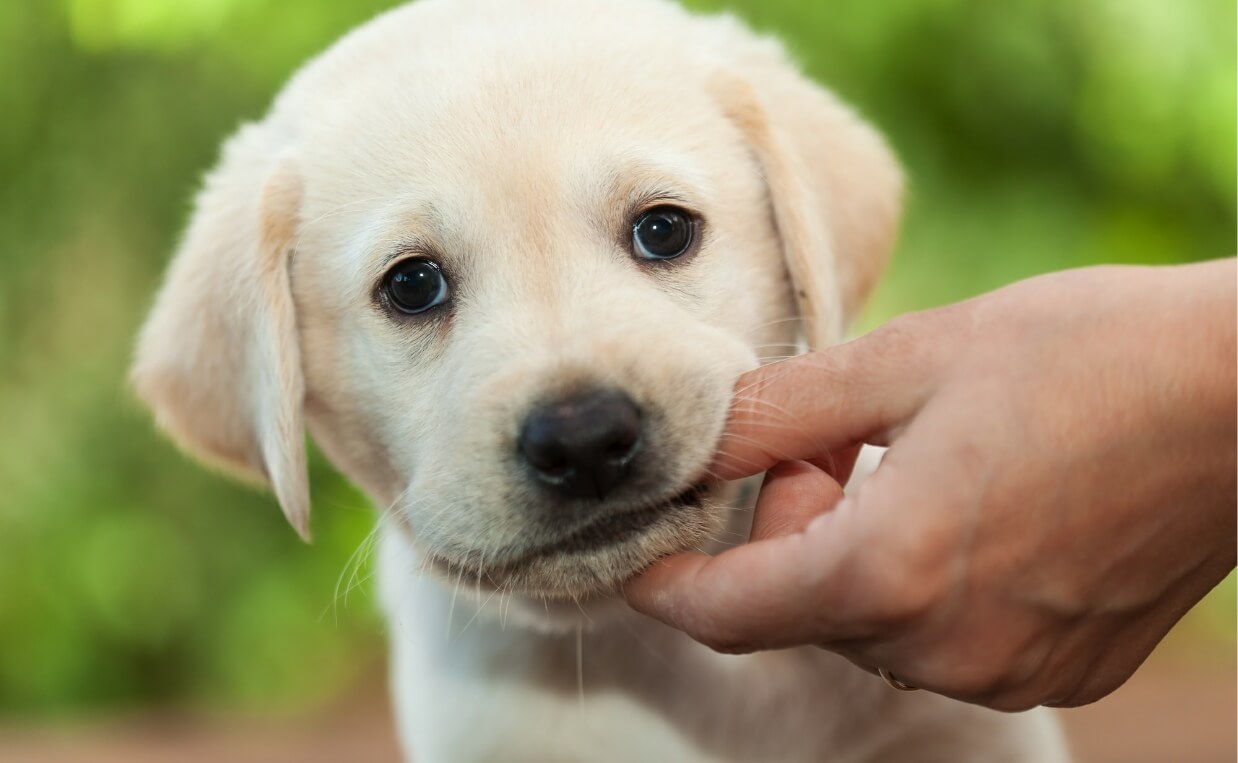
Biting is an inevitable part of having a puppy, but it can also be one of the most frustrating and painful. When puppies play, they often bite, chew and mouth on people’s hands, limbs and clothing. This kind of behavior may seem cute when they’re six weeks old, but it’s not nearly so endearing when he or she is three or four months old – and getting bigger by the day!
Dog trainers call puppy biting “play biting”, but it’s not fun when it hurts. However, it’s completely normal for puppy teething and necessary for development. The good news is you can train your puppy to not bite in a few simple steps.
Why Do Puppies Bite?
It’s normal for puppies to bite and chew during play and exploration. Like human babies, it’s how they learn about the world, and it plays an important role in their socialization. Plus, teething can be painful; it’s a natural instinct for puppies to want to chew on things to help ease the pain.
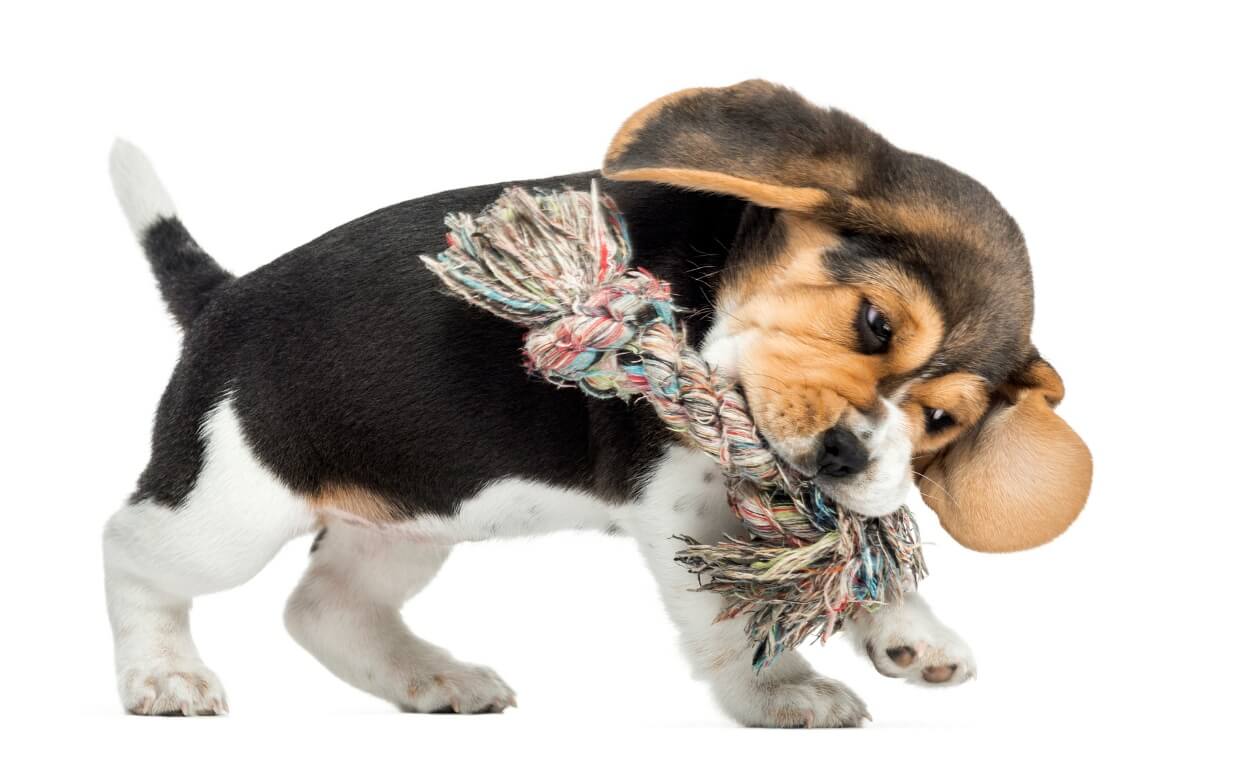
Here are a few reasons why puppies bite.
Exploring the World
Puppies learn a lot from biting things, including other puppies, their humans and inanimate objects. They receive sensory information on how hard they should bite a particular object, what it tastes like and whether they should bite on that object again.
When puppies explore their home, they will bite everything, including furniture, rugs, carpeting, pillows, clothing, shoes, remote controls, window frames, door jambs, their crate, their bed, their food bowl, etc.
Puppy Teething
Adult teeth start to come in about 12-16 weeks of age, and during this time, most puppies chew incessantly. Your puppy’s gums may be sore as they lose puppy teeth and adult teeth come in.
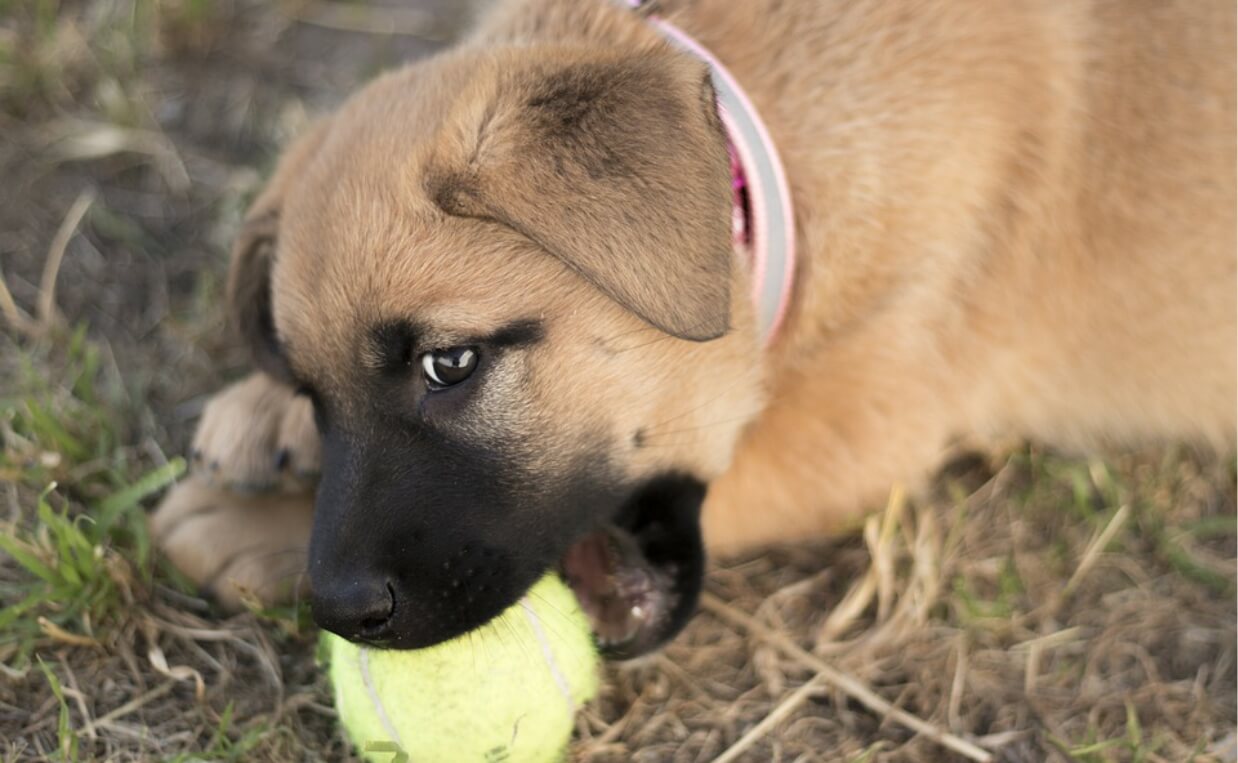
Play Behavior
Some puppies will exhibit a play bow (where they stretch their front legs out in front on the ground and lean down on their elbows, bringing the chest low to the ground) and other puppies will nip and bite to entice other puppies to play. When puppies bite each other, they learn a very important skill: bite inhibition.
With play biting, they learn how hard they can bite and what happens if they bite too hard. Normally, the puppy who is bitten will cry out and refuse to play for a few minutes. Through this interaction, puppies learn if they bite too hard the other puppies won’t want to play. Some puppies learn this the first time they bite too hard, but it might take some puppies multiple times to learn to soften their bite.
Puppies will try to engage you in play because, to them, this is normal dog behavior. When this happens, you will have to teach your puppy not to bite you too hard.
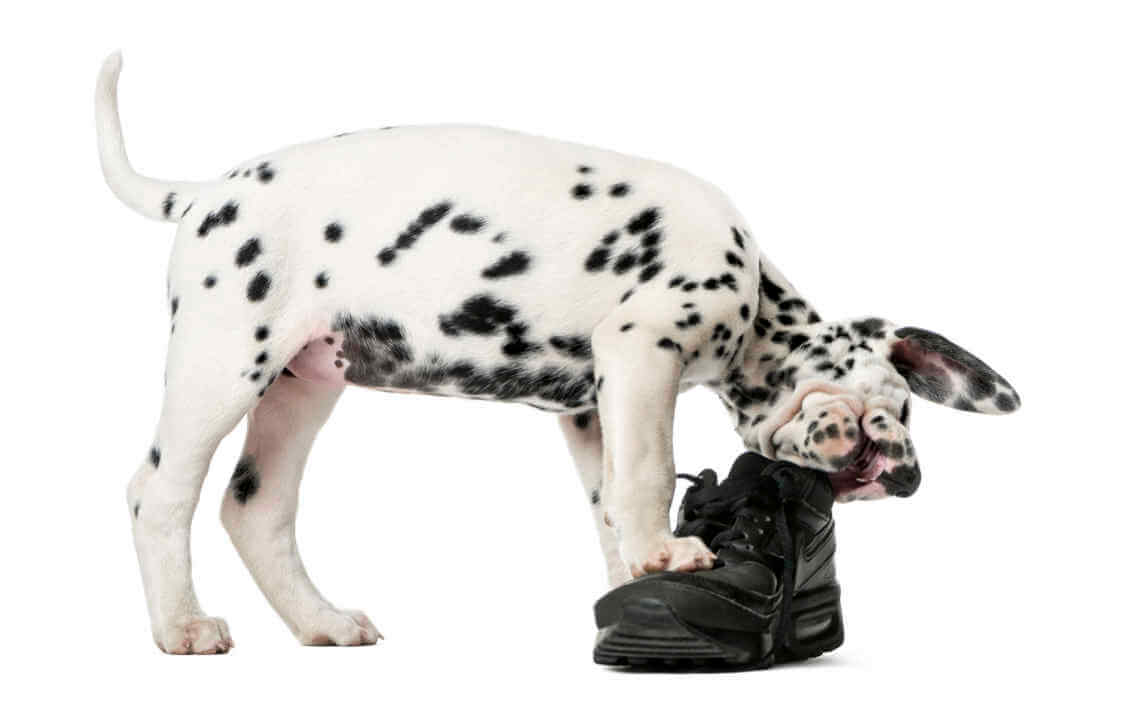
Tips for Teaching Your Puppy to Stop Biting
Even though biting is normal behavior for a puppy, you will still need to manage the behavior appropriately. You will need to be patient, persistent and consistent. If you feel frustrated by your puppy’s behavior, don’t hesitate to speak with your veterinarian or a professional canine behaviorist.
Here are some tips for training your puppy to stop biting.
-
Avoid harsh verbal or physical corrections
Verbal and physical corrections don’t teach your puppy how to behave; they only teach your dog to be afraid of you. Using punishment will lead to fear and anxiety in your puppy.
-
Give your dog plenty of physical exercise and mental stimulation, depending on your puppy’s breed and age
Some canine breeds need more physical and mental stimulation than others. And obviously, a 3 month old puppy will not have the stamina of a 6 month old. That said, puppies tend to have a lot of energy and curiosity, and if those needs aren’t met with reasonable exercise and things to do, your puppy will resort to biting and chewing. Schedule plenty of play sessions and exercise time with your puppy. If you do not give them enough mental stimulation, they may chew on random items – or you – to keep themselves busy.
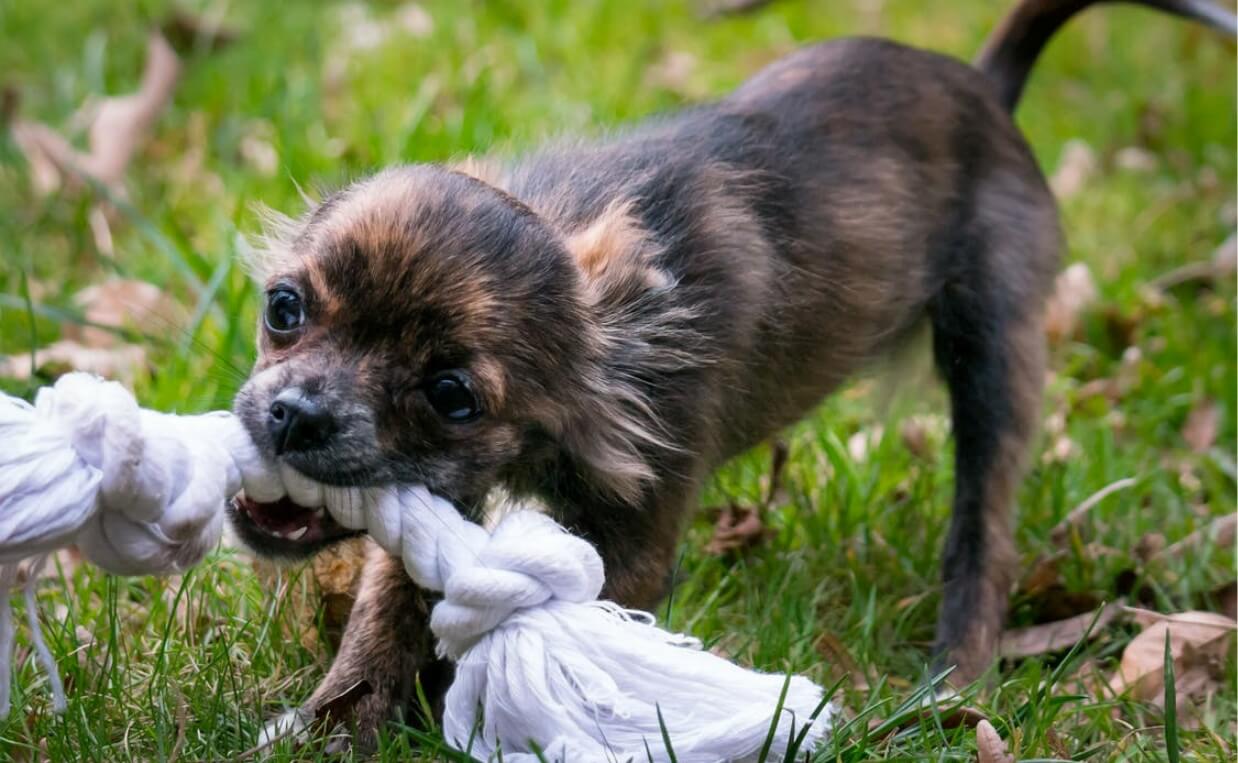
-
Give your puppy a wide variety of toys to chew on
One of the best ways to distract your puppy is with age-appropriate toys. If you anticipate your puppy will start biting or chewing, distract them with a toy they can chew on.
Start off with a good supply of various puppy-safe toys, such as soft rubber toys, a puppy-sized rubber ball, a rope toy, and a stuffed toy with a squeaker, or better yet, an
un-stuffed toy with a squeaker. Un-stuffed plush toys take away the danger of your pup
ingesting anything that they can get out of a stuffed toy. Try different puppy toys to see what your puppy likes.
Puppy teething toys can be offered when your puppy is teething age. These toys ease sore gums and are made with softer plastic so they won’t hurt the baby teeth or incoming adult teeth.
Whenever you anticipate your puppy will start biting, encourage your puppy to play with a toy. Whenever your puppy grabs the toy, offer plenty of verbal praise. If your puppy grabs your hand or clothing, do not immediately pull back. Make a sound (ow, ouch, something consistent) and move away. If your puppy follows you and tries to bite your feet and ankles, leave the room briefly and close the door. This will send a clear signal you do not want to play when your puppy bites you. Wait 10-20 seconds and then come back out. When your puppy comes to you, immediately engage them with the toy. Keep repeating this. Eventually, your puppy will figure out it’s more fun to bite a toy instead of you.
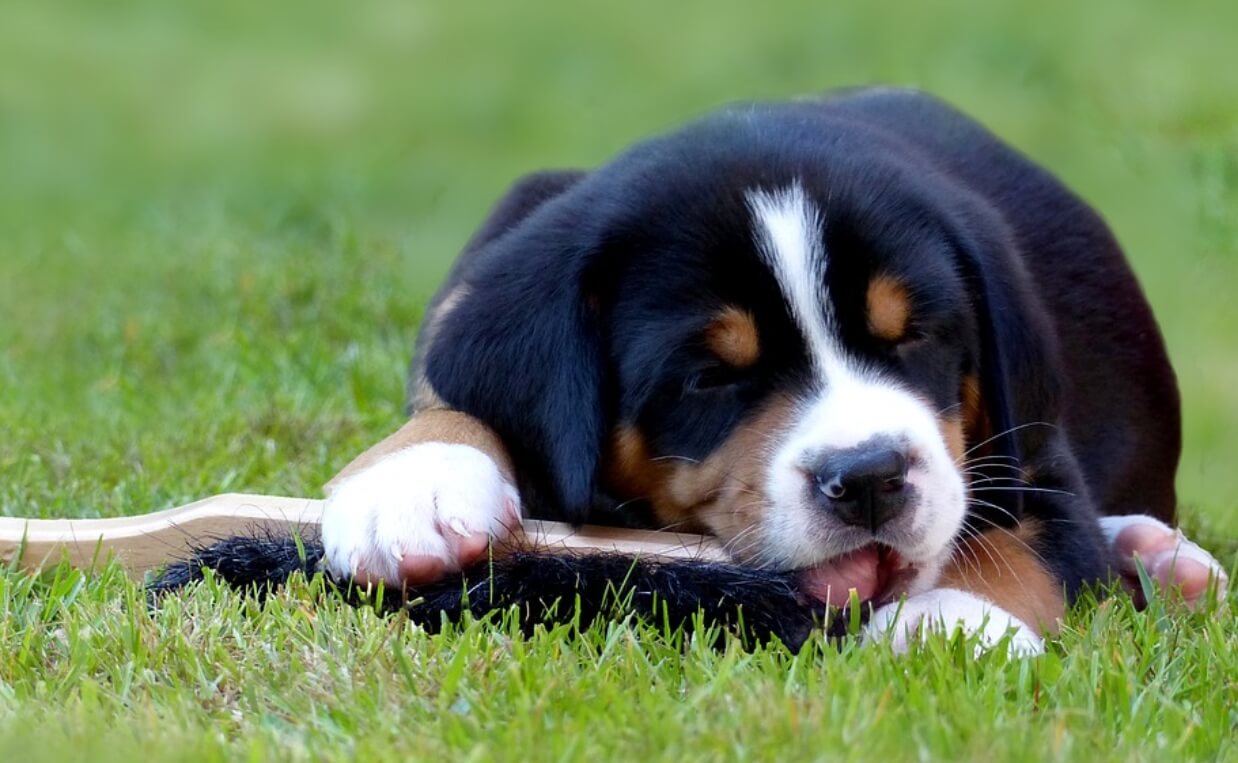
Supervise and engage with your puppy when they play with any toys to make sure they don’t chew off small pieces and swallow them.
-
Redirect your puppy’s attention with training cues
If you have started teaching your puppy some basic training cues (i.e. sit, lay down, roll over, etc.) you can redirect your puppy’s biting to training behaviors.
When your puppy bites, make a noise to distract them. Then, when they stop biting, immediately redirect them by practicing the training cues. Be sure to give them lots of praise and treat when they perform the behavior correctly.
-
Try puppy socialization class
Puppy socialization classes are an important part of your puppy’s education. In class, they learn to interact with puppies of different sizes, breeds and sexes. Puppy classes offer a controlled environment where they can learn from interactions with other puppies what is appropriate and what is not acceptable.
-
Enroll your puppy in daycare when they’re ready
There are many benefits to enrolling your puppy in daycare, but your puppy needs to have completed their first round of “adult” vaccines before enrollment. You should wait about two weeks after the date of their vaccinations before their first day. Also, you may want to start them out part-time so they don’t get over excited or tired.
- Socializing your puppy early helps them become a friendly, well-adjusted dog.
- It’s safer than leaving them home alone all day
- The exercise they get will keep them healthy
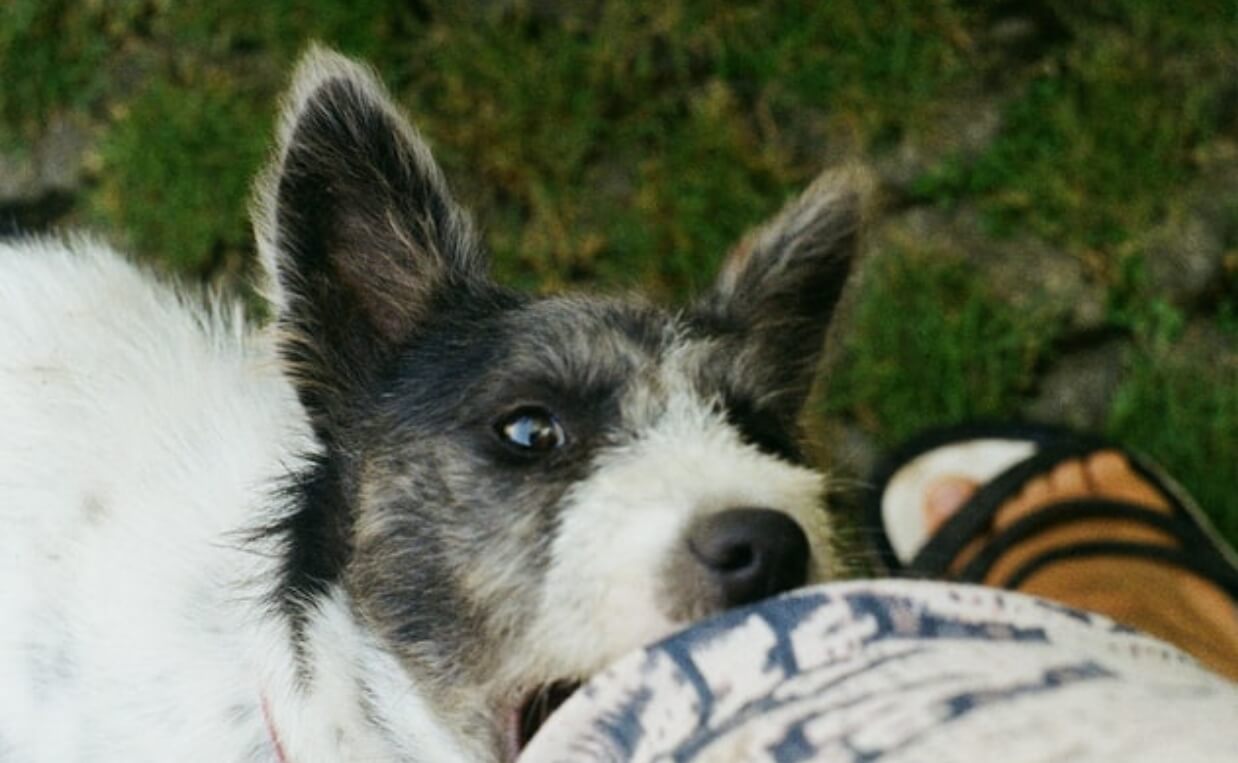
While nipping and biting are normal behaviors in puppies, they are not acceptable in older dogs. Remember, a large majority of dogs surrendered to shelters are between 18 months and 2 years, the age at which “cute” puppy behaviors become overwhelmingly frustrating to the owner. Taking these simple steps when your puppy is young will help prevent bad behaviors when he or she is older, giving you both the opportunity to have a stress-free, lifelong bond based on trust, love and understanding.
Want more information related to raising a puppy? Check out these blog posts:
- 18 Puppy Training Tips to Help You Stay Sane
- Why It’s Crucial You Start Grooming Your Puppy Early and Regularly
- 20 Uncomplicated Do’s and Don’ts for House Training Your New Puppy or Dog
- 6 Steps to Keep Your Puppy or Dog from Jumping Up
- Should You Feed Your Puppy Adult Dog Food?
- 10 Things You Forgot About Raising a Puppy
- New Puppy Checklist: Supplies You Need when Bringing a Puppy Home
- How to Puppy-Proof Your Home
Did your puppy bite like crazy? How long did it take to train your puppy not to bite? What strategies worked for you and your pup? Please share in the comments below…

 20 Uncomplicated Do’s and Don’ts for House Training Your New Puppy or Dog
20 Uncomplicated Do’s and Don’ts for House Training Your New Puppy or Dog How to Prevent Unwanted Food Guarding in Dogs
How to Prevent Unwanted Food Guarding in Dogs How to Teach Your Dog to Speak with Dog Talking Buttons
How to Teach Your Dog to Speak with Dog Talking Buttons What You Should Know About Our New Dog Obedience Training Program
What You Should Know About Our New Dog Obedience Training Program How to Curb Unwanted Chewing in Puppies
How to Curb Unwanted Chewing in Puppies






I have a little over a year old mix breed adopted from our local shelter,I also have him restored as an ESA. He play bites he is also a pincher. I had a 17 year old that nibbled pinching the skin to get a rise out of ya up to the time he passed away. I have noticed a few days ago that MAX has on the roof of his mouth what appears to be a tooth working its way through the skin. Surely this isn’t possible is it? It doesn’t appear to bother him but when we play i do have to remind him to close his mouth. I’m hoping to come up with plans for a teething ring for puppies that can withstand razor sharp teeth. Thank you for your time.
Tonya StClair
Thank you for stopping by the Canine Campus blog! We’re happy you came by and thanks for your comment!